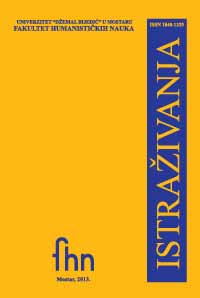TEŽIŠTA PROZE WILLIAMA FAULKNERA I MEŠE SELIMOVIĆA
KEY CONCEPTS IN FICTION BY WILLIAM FAULKNER AND MESA SELIMOVIC
Author(s): Selma RaljevićSubject(s): Literary Texts
Published by: Fakultet humanističkih nauka, Univerzitet »Džemal Bijedić« u Mostaru
Keywords: William Faulkner; Meša Selimović; načini i oblici pripovijedanja; stil i jezik
Summary/Abstract: The purpose of the paper is to critically analyze a narrative discourse in selected works by William Faulkner and Mesa Selimovic. Driven by a desire to tell the old truths in a new way, Faulkner and Selimovic both experimented with literary form and expression in order to give a new sensibility of the world they lived in. The aim of the paper is to focus on the major narrative issues of literary work of Faulkner and Selimovic such as literary form, style and language, so as to come to the conclusion that there are many similarities between the two writers and their work. For this reason, the paper comparatively explores Faulkner’s novels: The Sound and the Fury (1929), Light in August (1932), Absalom, Absalom! (1936), Go Down, Moses (1942), and Selimovic’s prose works: Death and the Dervish (Dervis i smrt, 1966), The Fortress (Tvrdjava, 1970), The Island (Ostrvo, 1974) and Memories (Sjecanja, 1976) within the context of modern literary theory and wider literary historical, theoretical or cultural debates.
Journal: Istraživanja
- Issue Year: 2013
- Issue No: 08
- Page Range: 149-163
- Page Count: 15
- Language: Bosnian

